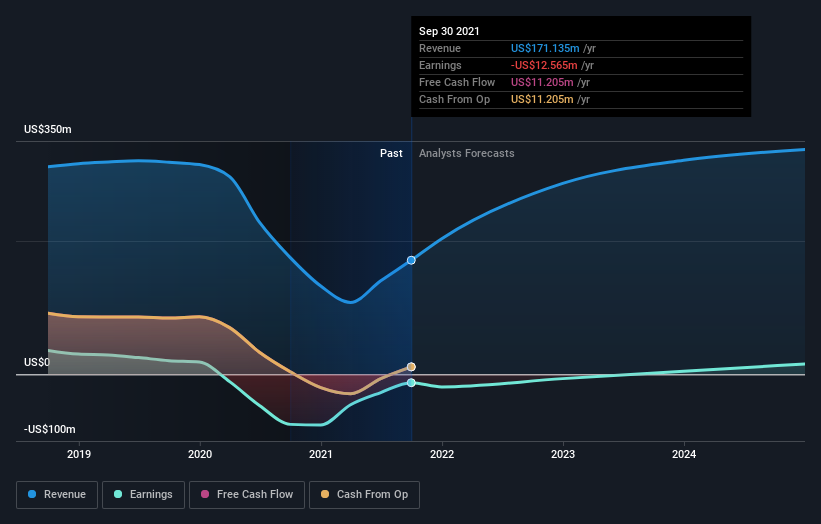Strong week for Chatham Lodging Trust (NYSE:CLDT) shareholders doesn't alleviate pain of three-year loss
This week we saw the Chatham Lodging Trust (NYSE:CLDT) share price climb by 10%. But that doesn't change the fact that the returns over the last three years have been less than pleasing. After all, the share price is down 32% in the last three years, significantly under-performing the market.
While the stock has risen 10% in the past week but long term shareholders are still in the red, let's see what the fundamentals can tell us.
View our latest analysis for Chatham Lodging Trust
Because Chatham Lodging Trust made a loss in the last twelve months, we think the market is probably more focussed on revenue and revenue growth, at least for now. When a company doesn't make profits, we'd generally expect to see good revenue growth. That's because fast revenue growth can be easily extrapolated to forecast profits, often of considerable size.
Over the last three years, Chatham Lodging Trust's revenue dropped 32% per year. That means its revenue trend is very weak compared to other loss making companies. On the face of it we'd posit the share price fall of 10% compound, over three years is well justified by the fundamental deterioration. The key question now is whether the company has the capacity to fund itself to profitability, without more cash. The company will need to return to revenue growth as quickly as possible, if it wants to see some enthusiasm from investors.
You can see how earnings and revenue have changed over time in the image below (click on the chart to see the exact values).
It's good to see that there was some significant insider buying in the last three months. That's a positive. That said, we think earnings and revenue growth trends are even more important factors to consider. This free report showing analyst forecasts should help you form a view on Chatham Lodging Trust
What about the Total Shareholder Return (TSR)?
We've already covered Chatham Lodging Trust's share price action, but we should also mention its total shareholder return (TSR). Arguably the TSR is a more complete return calculation because it accounts for the value of dividends (as if they were reinvested), along with the hypothetical value of any discounted capital that have been offered to shareholders. Dividends have been really beneficial for Chatham Lodging Trust shareholders, and that cash payout explains why its total shareholder loss of 26%, over the last 3 years, isn't as bad as the share price return.
A Different Perspective
It's nice to see that Chatham Lodging Trust shareholders have received a total shareholder return of 19% over the last year. There's no doubt those recent returns are much better than the TSR loss of 3% per year over five years. The long term loss makes us cautious, but the short term TSR gain certainly hints at a brighter future. It's always interesting to track share price performance over the longer term. But to understand Chatham Lodging Trust better, we need to consider many other factors. For instance, we've identified 2 warning signs for Chatham Lodging Trust (1 is concerning) that you should be aware of.
If you like to buy stocks alongside management, then you might just love this free list of companies. (Hint: insiders have been buying them).
Please note, the market returns quoted in this article reflect the market weighted average returns of stocks that currently trade on US exchanges.
Have feedback on this article? Concerned about the content? Get in touch with us directly. Alternatively, email editorial-team (at) simplywallst.com.
This article by Simply Wall St is general in nature. We provide commentary based on historical data and analyst forecasts only using an unbiased methodology and our articles are not intended to be financial advice. It does not constitute a recommendation to buy or sell any stock, and does not take account of your objectives, or your financial situation. We aim to bring you long-term focused analysis driven by fundamental data. Note that our analysis may not factor in the latest price-sensitive company announcements or qualitative material. Simply Wall St has no position in any stocks mentioned.

